Léon Degrelle
Léon Joseph Marie Ignace Degrelle (French: [dəgʁɛl]; 15 June 1906 – 31 March 1994)[3] was a Belgian Walloon politician and one of the most important Nazi collaborators and later, one of the founding fathers of Holocaust denial[4] from Belgium.[5] Degrelle rose to prominence Belgium in the 1930s as the leader of the clerical fascist Rexist Party.[6] During the German occupation in World War II, he enlisted in the German army and fought in the Walloon Legion on the Eastern Front. After the collapse of the Nazi regime, Degrelle escaped and went into exile in Francoist Spain, where he remained a prominent figure in neo-Nazi politics. He died 50 years after being sentenced to death and losing his Belgian nationality for collaboration in 1944.[3][7]
Léon Degrelle | |
|---|---|
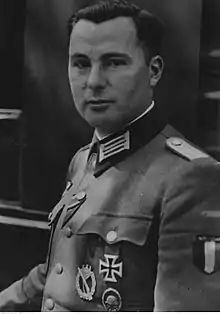 | |
| Leader of the Rexist Party | |
| In office 2 November 1935 – 30 March 1945 | |
| Personal details | |
| Born | Léon Joseph Marie Ignace Degrelle 15 June 1906 Bouillon, Luxembourg Province, Belgium |
| Died | 31 March 1994 (aged 87) Málaga, Andalusia, Spain |
| Cause of death | Cardiac arrest[1] |
| Political party | Rexist Party |
| Other political affiliations | Catholic Party |
| Children | 6 |
| Education | Law (but never graduated)[2] |
| Alma mater | Catholic University of Leuven |
| Occupation | Journalist |
| Known for | Member of Cedade |
| Military service | |
| Allegiance | |
| Branch/service | |
| Years of service | 1941–45 |
| Rank | Standartenführer |
| Commands | SS Division Wallonien |
| Battles/wars | World War II |
| Awards | Knight's Cross of the Iron Cross with Oak Leaves |
Before the war
After studying at a Jesuit college and attempting to get a degree in law and political sciences from the Catholic University of Leuven, but never graduating,[2] Degrelle worked as a journalist for the conservative Roman Catholic periodical Christus Rex. During his time at this publication, he became attracted to the ideas of Charles Maurras and French Integralism. Until 1934, Degrelle worked as a correspondent for the paper in Mexico, during the Cristero War. He led a radical group inside the Catholic Party, based on the Éditions de Rex publishing house. The Éditions drew its name from the battle cry of the Cristeros: Viva Cristo Rey y Santa María de Guadalupe, alluding to Christ the King.
Degrelle's actions inside the Catholic Party saw him come into opposition with the mainstream of the same party, many of whom were monarchist conservatives or centrists. The Rexist group, including the likes of Jean Denis, separated itself from the Catholic Party in 1935, after a meeting in Kortrijk. The newly formed party was heavily influenced by Fascism and Corporatism (but also included several elements interested solely in Nationalism or Ultramontanism); it had a vision of social equality that drew comparisons with Marxism but was staunchly anti-communist (anti-bolshevik). The party also came to denounce political corruption in Belgian politics. In 1936, in which Rex reached peak votes, it drew its support from Brussels (18.50%), Wallonia (15.16%), Flanders (7.01%), and Eupen-Malmedy (26.44%).[8] Rexism had a Flemish ideological competitor in the Vlaamsch Nationaal Verbond, which advocated an independent Flanders and exclusive use of the Dutch language.[9][10]
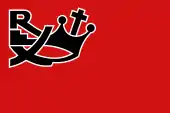
In 1936, Degrelle met Benito Mussolini and Adolf Hitler, both of whom provided Rexism with funds (2 million lire and 100,000 marks) and ideological support. Elections in that year had given the Parti Rexiste 21 deputies and 12 senators, although its influence declined by 1939 when it managed to win only four seats in each Chamber. The party progressively added Nazi-inspired Antisemitism to its agenda, and soon established contacts with fascist movements around Europe. Degrelle notably met with Falange leader José Antonio Primo de Rivera and the Iron Guard's Corneliu Zelea Codreanu.
In the mid-1930s, Degrelle became acquainted with the cartoonist Hergé. In a volume published after his death (Tintin mon copain), the Rexist leader claimed that his years of journalism had inspired the creation of The Adventures of Tintin, although Hergé stated that the character was instead based on his brother, Paul Remi. Degrelle had been shipping Mexican newspapers containing American cartoons to Belgium, and Hergé did admit years later in 1975 that Degrelle deserved credit for introducing him to the comic "strip".[11]
Collaboration
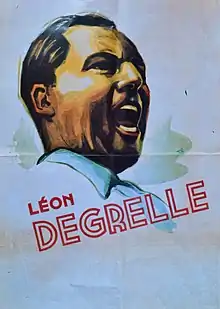
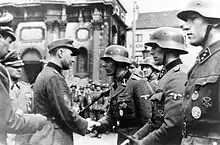
When the war began, Degrelle approved of King Leopold III's policy of neutrality. After the Germans invaded Belgium on 10 May 1940, the Rexist Party split over the matter of resistance. He was arrested as a suspected collaborator and evacuated to France. Unlike other Belgian deportees, Degrelle was spared in the Massacre of Abbeville and instead sent into a French concentration camp. He was later released when the occupation began.
Degrelle returned to Belgium and proclaimed reconstructed Rexism to be in close union with Nazism—in marked contrast with the small group of former Rexists (such as Théo Simon and Lucien Mayer) who had begun fighting against the Nazi occupiers from the underground. In August, Degrelle started contributing to a Nazi news source, Le Pays Réel (a reference to Charles Maurras). Degrelle joined the Walloon legion of the Wehrmacht, which was raised in August 1941, to fight against the Soviet Union on the Eastern Front. The leadership of the Rexists then passed to Victor Matthys. Lacking any previous military service, Degrelle joined as a private and was awarded the Iron Cross Second Class in March 1942. He quickly rose through the ranks, becoming a lieutenant in May 1942, and received the Iron Cross First Class the same month. Initially, the group was meant to represent a continuation of the Belgian Army, and fought as such during Operation Barbarossa, while integrating many Walloons who had volunteered for service. The Walloons were transferred from the Wehrmacht to the Waffen-SS in June 1943,[7][12] becoming the Sturmbrigade Wallonien and served on the Eastern Front.[12][13]
From 1940, the Belgian Roman Catholic hierarchy had banned all uniforms during Mass. On 25 July 1943, in his native Bouillon, Degrelle was told by Dean Rev Poncelet to leave a Requiem Mass, because he was wearing his SS uniform, which church authorities had prohibited. Degrelle was excommunicated by the Bishop of Namur, but the excommunication was later lifted by the Germans since as a German officer he was under the jurisdiction of the German chaplaincy.[14]
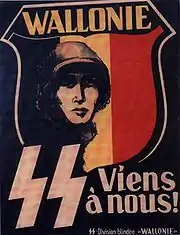
After being wounded at Cherkasy in 1943, Degrelle continued to climb the SS hierarchy after the inclusion of Walloons in the Waffen-SS.
During the battle of the Korsun-Cherkassy Pocket, fought from 24 January to 16 February 1944, the Wallonien was given the task of defending against Soviet attacks on the eastern side of the pocket. While General Wilhelm Stemmermann, the overall commander for the trapped forces, moved them to the west of the pocket in readiness for a breakout attempt, Wallonien and Wiking were ordered to act as a rearguard. After Lippert was killed, Degrelle took command of the Brigade, and the Wallonien began its withdrawal under heavy fire. Of the brigade's 2,000 men, only 632 survived.
For his actions at Korsun, Degrelle was promoted to SS-Sturmbannführer (major). He was awarded the Knight's Cross of the Iron Cross (Ritterkreuz) by Hitler in February 1944. Degrelle later claimed Hitler told him, "You are truly unique in history. You are a political leader who fights like a soldier. If I had a son, I would want him to be like you."[15]
Six months later Degrelle was awarded the Knight's Cross with Oak Leaves,[7] as were seven other non-Germans.
The unit was sent back to Wildflecken to be reformed. In June 1944, a 440-man battalion of the Wallonien was sent to Estonia to assist in the defence of the Tannenberg Line. After Operation Bagration began, Army Group North began to fall back into the Kurland Pocket. The battalion left through the port of Tallinn (Reval) on the Baltic Sea. The remnants of the Battalion were sent back to join the rest of the brigade, which was located at Breslau.
On 8 July 1944 Degrelle's brother Édouard, a pharmacist, was killed in Degrelle's hometown of Bouillon by Belgian resistance fighters. Shortly afterwards, a Rexist hit squad executed pharmacist Henri Charles. A few days later, three civilian hostages were executed, apparently on Degrelle's orders, as all three were known to be his political enemies.
He commanded Sturmbrigade Wallonien from 18 September 1944 to 8 May 1945. He led the unit in the defense of Estonia against the Soviets. He was promoted to SS-Obersturmbannführer (lieutenant colonel) in the early months of 1945.[7]
Degrelle was promoted to SS-Standartenführer (colonel) on 20 April 1945. On 1 May 1945, Degrelle was promoted by SS Reichsfuhrer Heinrich Himmler to Brigadeführer (brigadier general). This promotion, however, was extralegal due to Himmler having been removed from office on Hitler's orders on 28 April.[7]
Degrelle was wounded in action several times during the war on the Eastern Front and received the Wound Badge 1st Class and the Gold Close Combat Clasp, although none of his injuries were serious enough to require hospitalization.[7]
Awards
- 27 August 1944 – Knight's Cross of the Iron Cross with Oak Leaves as SS-Sturmbannführer d. R. and Kdr. 5.SS-Freiwilligen-Panzer-Brigade "Wallonien" / Kampfgruppe Wagner / Armee-Abteilung Narwa / Army Group North[7]
- 20 February 1944 – Knight's Cross of the Iron Cross as SS-Hauptsturmfuhrer d. R., and Führer SS-Sturmbrigade "Wallonien" / 8.Armee / Army Group South
- 9 October 1944 – German Cross in Gold as SS-Sturmbannführer d. R. and Kdr. 5.SS-Freiwilligen-Sturmbrigade "Wallonien" / 5.SS-Panzer-Division "Wiking" / III.(germanische) SS-Panzer-Korps / Armee-Abteilung Grasser / Army Group North
- 25 May 1942 – Iron Cross, 1st Class [7]
- 3 March 1942 – Iron Cross, 2nd Class[16]
- War Merit Cross, 2nd Class
- Wound Badge, 1st Class
- Gold Close Combat Clasp [7]
- August 1942 – Infantry Assault Badge
- Eastern Front Medal
Promotions
- Schütze (Rifleman), Heer – 3 March 1942
- Leutnant (Lieutenant), Heer – May 1943
- Untersturmführer (Lieutenant), Waffen SS – June 1943
- Hauptsturmführer (Captain), Waffen SS – 1 January 1944
- Sturmbannfuhrer (Major), Waffen SS – 20 April 1944
- Obersturmbannführer (Lieutenant Colonel), Waffen SS – c. January 1945
- Standartenfuhrer (Colonel), Waffen SS – 20 April 1945[7]
After the war
_-_Fondo_Car-Kutxa_Fototeka.jpg.webp)
With the surrender of Berlin on 2 May 1945, Degrelle was desperate to avoid Russian captivity and ordered as many of his worn-out veterans as possible to make for the Baltic port of Lübeck to surrender to the British.[17] Degrelle himself fled first to Denmark and then Norway, where he commandeered a Heinkel He 111 aircraft,[18] allegedly provided by Albert Speer.[19][20] After a 1,500-mile (2,400 km) flight over portions of Allied-occupied Europe, he crash-landed on the beach at San Sebastian in northern Spain, but was gravely injured and hospitalized for over a year.[7] Several attempts were made to bring Degrelle to justice, including attempts to kidnap and to assassinate him, but they all failed.[5][7] He was sentenced to death by trial in absentia.[21]
In 1954, in order to prevent extradition to Belgium,[5] Spain granted him Spanish citizenship under the name José León Ramírez Reina after being adopted by an older Spanish woman,[22][23] and the Falange assigned him the leadership of a construction firm that benefited from state contracts, including with the U.S. government to build military airfields in Spain.[7] Meanwhile, friends scoured Europe for his children. In time, all were found and spirited to Spain.[24]
While in Francoist Spain, Degrelle maintained a high standard of living and frequently appeared in public and private meetings in a white uniform featuring his German decorations, while expressing his pride over his close contacts and "thinking bond" with Adolf Hitler. He continued to live undisturbed when Spain transitioned to democracy after the death of Franco, and continued publishing polemics, voicing his support for the political far right. He became active in the Neo-Nazi Círculo Español de Amigos de Europa (Cedade) and ran its printing press in Barcelona, where he published a large portion of his writings, including an Open Letter to Pope John Paul II[25] on the topic of the Auschwitz concentration camp, asking the Pope not to go.[26]
His repeated statements on the topic of Nazi genocide brought Degrelle to trial with Violeta Friedman, a Romanian-born survivor of the camps.[27] Although lower courts were initially favourable to Degrelle, the Supreme Court of Spain decided he had offended the memory of the victims, both Jews and non-Jews, and sentenced him to pay a substantial fine. Asked if he had any regrets about the war, his reply was "Only that we lost!"[4]
In 1994, Léon Degrelle died of cardiac arrest in a hospital in Málaga.[7][5]
Works by Degrelle
- Mes aventures au Mexique (in French). Paris: Editions Rex. 1933.
- Meine Abenteuer in Mexiko (in German). Translated by Charlotte Demmig. Augsburg: Literarisches Institut P. Haas. 1937.
- J'accuse Marcel-Henri Jaspar: Menteur, pillard et faussaire (in French). Bruxelles: Editions Rex. 1936.
- État d'âme (in French). Bruxelles: Editions Rex. 1938.
- Guerre en prison; Oorlog achter de tralies (in Dutch). Brussel: Uitgeverij Ignis. 1942..
- Ich war Gefangener (in German). Nürnberg: Hesperos Verlag. 1944.
- Feldpost. Bruxelles: Éditions Rex. 1944.
- Feldpost. Erpe: De Krijger. 2007. ISBN 9789058681867.
- La Cohue de 1940. Lausanne: R. Crausaz. 1949.
- Hitler pour 1000 ans (in French). Paris: La Table ronde. 1969.
- Front de l'Est, 1941-1945. Paris: La Table Rond. 1969.
- Campaign in Russia: The Waffen SS on the Eastern Front (1st English language ed.). Torrance, CA: Institute for Historical Review. 1985. ISBN 0939484188.[28]
- Campaign in Russia: The Waffen SS on the Eastern Front. Bristol: Crecy Books. 1985. ISBN 0-947554-04-1.
- The Eastern Front: Memoirs of a Waffen SS volunteer, 1941-1945 (second English-language, edited and reset ed.). Newport Beach, CA: Institute for Historical Review. 2014. ISBN 9780939484768.
- Campaign in Russia: The Waffen SS on the Eastern Front.
- Face à face avec le rexisme (in French). Strombeek-Bever: Éditions "De Schorpioen". 1971.
- Oog in oog met de rex-leider [Face to Face with the Rex-leader] (in Dutch). Strombeek-Bever: Uitgeverij De Schorpioen. 1971.
- Dannau, Wim (1973). Ainsi parla Léon Degrelle. 1–12. Wemmel: Éditions "Byblos".
- Lettres à mon cardinal (Léon Degrelle). Message aux Belges par Otto Skorzeny (in French). Bruxelles: L'Europe réelle. 1975.
- Franco chef d'État (in French). Braine-le-Comte: Éditions du Baucens. 1976. ISBN 2801900117.
- Poèmes. Paris: Art et histoire d'Europe. 1985. ISBN 290602600X.
- Léon Degrelle, persiste et signe: interviews / recueillies pour la télévision française par Jean-Michel Charlier. Paris: J. Picollec. 1985. ISBN 2864770687.
- Hitler, né à Versailles (in French). 1–3. Paris: Art et histoire d'Europe. 1986. ISBN 2906026085..
- Hitler, Born at Versailles. 1–3. Newport Beach, CA, USA: Institute for Historical Review. 1987. ISBN 0939484250.
- Hitler démocrate. Le siècle de Hitler, 4 (in French). 1–3. Paris: Éd. de l'Homme libre. 2002. ISBN 291210419X..
- Hitler Democrat. Washington D.C.: Barnes Review. 2012. ISBN 9781937787110..
- Hitler unificateur de l'Allemagne. Le siècle de Hitler, 6 (in French). Paris: Éd. de l'Homme libre. 2006. ISBN 291210419X..
- Les âmes qui brûlent. Paris: Editions de l'Association nationale Pétain-Verdun. 1993. ISBN 2950709117.
- Letter to the Pope on his visit to Auschwitz (PDF). Historical Review Press. 1979.
References
- Rule, Richard. "Was Leon Degrelle a Traitor of Belgium, or a German Army Hero?". warfarehistorynetwork.com.
- Cheyns, Bruno (2017). Léon Degrelle: De Führer uit Bouillon – Biografie (in Dutch). Vrijdag, Uitgeverij. ISBN 978-94-6001-608-0.
- Top nazi collaborator Léon Degrelle died in Spain, Los Angeles Times, 3 April 1994
- Christopher Ailsby (2004). Hitler's Renegades: Foreign Nationals in the Service of the Third Reich. Potomac Books Inc. p. 75. ISBN 1574888382.
- Top nazi collaborator Léon Degrelle died , nytimes 2 April 1994
- The rexist movement in Belgium, PhD thesis Martin Conway, 1989, university of Oxford
- Bouysse, Gregory (15 January 2019). Encyclopedia of the New Order – Special Issue – Wallonia (Part I). ISBN 9780244450595.
- Jean Ladrière, François Perin & Jean Meynaud. La décision politique en Belgique, CRISP, Bruxelles, 1965, pp. Annexe III, pp. 85–86.
- Jones, Derek (2001). Censorship: A World Encyclopedia. Routledge. p. 209. ISBN 978-1-136-79864-1.
- Kinderen van de collaboratie Ervaringen en getuigenissen van nakomelingen van collaborateurs in de Tweede Wereldoorlog, Ugent 2010 Master thesis history in Dutch
- Farr, Michael (2007). The Adventures of Hergé (Re-release ed.). Last Gasp. pp. 27, 53. ISBN 978-0-86719-679-5.; (first published 2007 by John Murray Publishers Ltd.)
- Wouters 2018, p. 272.
- Plisnier 2011, p. 100.
- "Degrelle's ex-communication reversed". CatholicHerald.co.uk.
- Degrelle, Léon (1985). Campaign in Russia : the Waffen SS on the Eastern Front (PDF) (1st English language ed.). Institute for Historical Review. p. 4. ISBN 0-947554-04-1.
- Thomas 1997, p. 111.
- Degrelle, Léon (1985). Campaign in Russia : the Waffen SS on the Eastern Front (PDF) (1st English language ed.). Institute for Historical Review. p. 324. ISBN 0-947554-04-1.
- Degrelle, Léon (1985). Campaign in Russia : the Waffen SS on the Eastern Front (PDF) (1st English language ed.). Institute for Historical Review. p. 345. ISBN 0-947554-04-1.
- Leon Degrelle, Belgian fascist, Hitler allay, dies The Washington Post
- At easy in his refuge in Spain, top Belgian fascist extols past The New York Times, John Darnton, 20 May 1983
- 25 tot 31 december 1944: generaal Patton redt Bastenaken vrt.be, Tim Trachet en Jan Ouvry, 25 December 2019, article in Dutch
- Obituary top nazi collaborator Léon Degrelle independent.co.uk 7 April 1994
- War criminal Degrelle allowed to stay in Span Nieuwsblad, 4 November 2017, article in dutch
- Leon Degrelle: Traitor of Belgium https://warfarehistorynetwork.com/ 18 August 2018, article by Australian author Richard Rule
- Lentin, Ronit (2004). Re-presenting the Shoah for the 21st Century. Berghahn Books. p. 198. ISBN 978-1-78920-587-9.
- Keith Vincent, Frederick Julian. (2018). Belgium's Rexist Past: the Problem of Constructing Identity in Belgium (PDF) (MSc). Universität Wien.
- Reimagining Spain Maastricht University, Hristova-Dijkstra, M. J. (2016). Reimagining Spain: transnational entanglements and remembrance of the Spanish Civil War since 1989. Maastricht: Datawyse / Universitaire Pers Maastricht
- Hill, Adam (26 June 2007). "Campaign in Russia, Book Review". Historical Warfare. Archived from the original on 5 January 2010. Retrieved 12 March 2015.
Sources
- Baland, Lionel (2009). Léon Degrelle et la presse rexiste (in French). Paris: Déterna. ISBN 9782913044869.
- Berger, Florian (2004). Ritterkreuzträger mit Nahkampfspange in Gold [Knight's Cross Bearers with the Close Combat Clasp in Gold] (in German). Vienna, Austria: Selbstverlag Florian Berger. ISBN 978-3-9501307-3-7.
- Bruyne, Eddy de; Rikmenspoel, Marc (2004). For Rex and Belgium: Leon Degrelle and Walloon Political & Military Collaboration 1940-1945. Solihull, West Midlands, England: Helion. ISBN 1-874622-32-9.
- Conway, Martin (1993). Collaboration in Belgium: Leon Degrelle and the Rexist Movement, 1940-1944. New Haven: Yale University Press. ISBN 0-300-05500-5.
- Fellgiebel, Walther-Peer (2000) [1986]. Die Träger des Ritterkreuzes des Eisernen Kreuzes 1939–1945 — Die Inhaber der höchsten Auszeichnung des Zweiten Weltkrieges aller Wehrmachtteile [The Bearers of the Knight's Cross of the Iron Cross 1939–1945 — The Owners of the Highest Award of the Second World War of all Wehrmacht Branches] (in German). Friedberg, Germany: Podzun-Pallas. ISBN 978-3-7909-0284-6.
- Griffin, Roger, ed. (1997). Fascism. ISBN 0-19-289249-5.
- Rees, Philip (1991). Biographical Dictionary of the Extreme Right Since 1890. ISBN 0-13-089301-3.
- Scherzer, Veit (2007). Die Ritterkreuzträger 1939–1945 Die Inhaber des Ritterkreuzes des Eisernen Kreuzes 1939 von Heer, Luftwaffe, Kriegsmarine, Waffen-SS, Volkssturm sowie mit Deutschland verbündeter Streitkräfte nach den Unterlagen des Bundesarchives [The Knight's Cross Bearers 1939–1945 The Holders of the Knight's Cross of the Iron Cross 1939 by Army, Air Force, Navy, Waffen-SS, Volkssturm and Allied Forces with Germany According to the Documents of the Federal Archives] (in German). Jena, Germany: Scherzers Militaer-Verlag. ISBN 978-3-938845-17-2.
- Streel, José (2010) [1st. pub. as La révolution du vingtième siècle, Bruxelles: Nouvelle société d'éditions: 1942]. La révolution du XXème siècle [The Revolution of the Twentieth Century] (in French). Paris: Déterna. ISBN 978-3-7648-2299-6.
- Thomas, Franz (1997). Die Eichenlaubträger 1939–1945 Band 1: A–K [The Oak Leaves Bearers 1939–1945 Volume 1: A–K] (in German). Osnabrück, Germany: Biblio-Verlag. ISBN 978-3-7648-2299-6.CS1 maint: ref=harv (link)
- Plisnier, Flore (2011). Ils ont pris les armes pour Hitler: la collaboration armée en Belgique francophone. Brussels: Renaissance du Livre. ISBN 9782507003616.
- Wouters, Nico (2018). "Belgium". In Stahel, David (ed.). Joining Hitler's Crusade: European Nations and the Invasion of the Soviet Union, 1941. Cambridge: Cambridge University Press. pp. 260–287. ISBN 978-1-316-51034-6.
- Rule, Richard. "Was Leon Degrelle a Traitor of Belgium, or a German Army Hero?". warfarehistorynetwork.com.
External links
| Wikimedia Commons has media related to Léon Degrelle. |
| Military offices | ||
|---|---|---|
| Preceded by SS-Oberführer Karl Burk |
Commander of 28th SS Volunteer Grenadier Division Wallonien 30 January 1945 – 8 May 1945 |
Succeeded by Disbanded |
